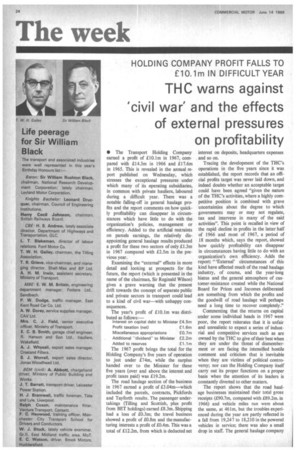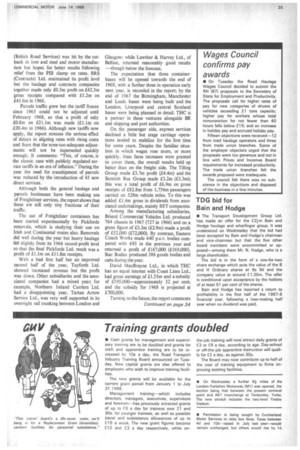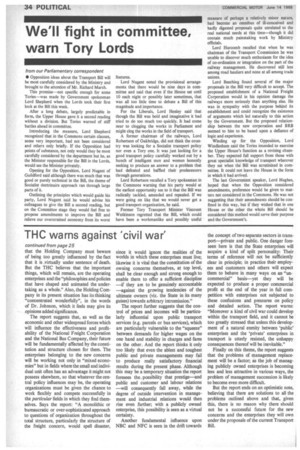HOLDING COMPANY PROFIT FALLS TO £10.1m IN DIFFICULT YEAR
Page 26

Page 27

Page 36

If you've noticed an error in this article please click here to report it so we can fix it.
TH C warns against 'civil war' and the effects of external pressures on profitability
• The Transport Holding Company earned a profit of £10.1m in 1967, compared with £14.3m in 1966 and £17.6m in 1965. This is revealed in the annual report published on Wednesday, which stresses the exceptional pressures under which many of its operating subsidiaries, in common with private hauliers, laboured during a difficult year. There was a notable falling-off in general haulage profits and the report comments on how quickly profitability can disappear in circumstances which have little to do with the organization's policies, management or efficiency. Added to the artificial restraints on parcels earnings, the relatively disappointing general haulage results produced a profit for these two sectors of only £1.3m in 1967 compared with £2.5m in the previous year.
Examining the "external" effects in more detail and looking at prospects for the future, the report (which is presented in the name of the chairman, Sir Reginald Wilson) gives a grave warning that the present drift towards the concept of separate public and private sectors in transport could lead to a kind of civil war—with unhappy consequences.
The year's profit of £10.1m was distributed as follows:— Interest on capital debt to Minister £4.5m
Profit taxation (net) El .6m Miscellaneous appropriations E0.7rn Additional "dividend" to Minister £2.2m Added to reserves El .1 m
The 1967 profit brings the total for the Holding Company's five years of operation to just under £74m, while the surplus handed over to the Minister for these five years (over and above the interest and profit taxes paid) was £19.2m.
The road haulage section of the business in 1967 earned a profit of £3.04m—which included the parcels, contracts, Pickfords and Tayforth results. The passenger undertakings (Tilling and Scottish, plus profit from BET holdings) earned £8.3m. Shipping had a loss of £0.3m; the travel business showed a profit of £0.8m and the manufacturing interests a profit of £0.4m. This was a total of £12.2m, from which is deducted net interest on deposits, headquarters expenses and so on.
Tracing the development of the THC's operations in the five years since it was established, the report records that an official profits target was never laid down, and indeed doubts whether an acceptable target could have been agreed "given the nature of the THC's activities, where a highly competitive position is combined with grave uncertainties about the degree to which governments may or may not regulate, tax and intervene in many of the said activities". This point is recalled in view of the rapid decline in profits in the latter half of 1966 and most of 1967, a period of 18 months which, says the report, showed how quickly profitability can disappear in circumstances having little to do with an organization's own efficiency. Adds the report: "'External' circumstances of this kind have affected much of the road haulage industry, of course, and the year-long hiatus and the general atmosphere of customer-resistance created while the National Board for Prices and Incomes deliberated are something from which the profits and the goodwill of road haulage will perhaps need a long time to recover completely."
Commenting that the returns on capital under some individual heads in 1967 were poor, the report reiterates that it is unfair and unrealistic to expect a series of industrial and competitive services such as are owned by the THC to give of their best when they are under the threat of dismemberment or are facing the intensified hostile comment and criticism that is inevitable when they are victims of political controversy; nor can the Holding Company itself catty out its proper functions on a proper basis when the attention of its leaders is constantly diverted to other matters.
The report shows that the road haulage businesses maintained their total gross receipts (£90.7m, compared with £89.2m. in 1966) and vehicle miles run were about the same, at 461m, but the troubles experienced during the year are partly reflected in a fall from 19,247 to 18,210 in the powered vehicles in service; there was also a small drop in staff. The general haulage company (British Road Services) was hit by the cutback in iron and steel and motor manufacture but hopes for better results following relief from the PLB clamp on rates. BRS (Contracts) Ltd. maintained its profit level but the haulage and contracts companies together made only £0.5m profit on £42.3m gross receipts compared with £1.2m on £41.6m in 1966.
Parcels traffic grew but the tariff frozen since 1965 could not be adjusted until February 1968, so that a profit of only £0.8m on £21.1m was made (£1.1m on £20.4m in 1966). Although new tariffs now apply, the report stresses the serious effect of delays in aligning rates with rising costs and fears that the none-too-adequate adjustments will not be Superseded quickly enough. It comments: "This, of course, is the classic case with publicly regulated service tariffs in an era of inflation." During the year the need for transhipment of parcels was reduced by the introduction of 45 new direct services.
Although both the general haulage and parcels businesses have been making use of Freightliner services, the report shows that these are still only tiny fractions of their traffic.
The use of Freightliner containers has been started experimentally by Pickfords removals, which is studying their use on Irish and Continental routes also. Removals did well during the year but heavy haulage fell slightly from its 1966 record-profit level so that the final Pickfords Ltd. result was a profit of £1.1m on £11.8m receipts.
With a bad first half but an improved second half of the year, Tayforth Ltd. showed increased revenue but the profit was down. Other subsidiaries and the associated companies had a mixed year; for example, Northern Ireland Carriers Ltd. had a disappointing year, Tartan Arrow Service Ltd., was very well supported in its overnight rail trunking between London and Glasgow; while Lawther & Harvey Ltd., of Belfast, returned reasonably good results —though below the forecast.
The expectation that three containerbases will be opened towards the end of 1968, with a further three in operation early next year, is recorded in the report; by the end of 1967 the Birmingham, Manchester and Leeds bases were being built and the London. Liverpool and central Scotland bases were being planned in detail. THC is a partner in these ventures alongside BR and shipping and port authorities.
On the passenger side, express services declined a little but stage carriage operations tended to stabilize for the first time for some years. Despite the familiar situation in which wages rose more, or more quickly, than fares increases were granted to cover them, the overall results held up better than on the freight side. The Tilling Group made £3.7m profit (£4.4m) and the Scottish Bus Group made £3.2m (£3.3m); this was a total profit of £6.9m on gross receipts of £82.8m from 1,756m passengers carried on 528m vehicle miles. To this was added £1.4m gross in dividends from associated undertakings, mainly BET companies.
Among the manufacturing subsidiaries, Bristol Commercial Vehicles Ltd. produced 764 chassis in 1967 (727 in 1966) and on a gross figure of £3.3m (£2.9m) made a profit of £52,000 (£72,000). By contrast, Eastern Coach Works made 640 p.s.v. bodies compared with 693 in the previous year and returned a profit of £167,000 (£169,000). Star Bodies produced 386 goods bodies and cabs during the year.
David MacBrayne Ltd., in which THC has an equal interest with Coast Lines Ltd., had gross earnings of £1.55m and a subsidy of £595,000—approximately 32 per cent; and the subsidy for 1968 is projected at £700,000.
Turning to the future, the report comments Continued on page 34 that the Holding Company must beware of being too greatly influenced by the fact that it is ,virtually under sentence of death. But the THC believes that the important things, which will remain, are the operating enterprises and the "philosophies and policies that have shaped and animated the undertaking as a whole." Also, the Holding Company in its present situation has its thinking "concentrated wonderfully", in the words of Dr. Johnson, which it feels may give its opinions added significance.
The report suggests that, as well as the economic and other widespread forces which will influence the effectiveness and profitability of the National Freight Corporation and the National Bus Company, their future will be fundamentally affected by the constitution and structure chosen for them. The enterprises belonging to the new concerns will be working not only in "mixed economies" but in fields where the small and individual unit often has an advantage it might not possess elsewhere, so that whatever the central policy influences may be, the operating organizations must be given the chance to work flexibly and compete successfully in the particular fields in which they find themselves. Says the report: "A monolithic or bureaucratic or over-sophisticated approach to questions of organization throughout the total structure, particularly the structure of the freight concern, would spell disaster, since it would ignore the realities of the worlds in which these enterprises must live; likewise it is vital that the constitution of the owning concerns themselves, at top level, shall be clear enough and strong enough to enable them to offer a sufficient discipline —if they are to be genuinely accountable —against the growing tendencies of the ultimate owners (viz, the State in its many guises) towards arbitrary intromission."
The report further suggests that the control of prices and incomes will be particulady influential upon public transport services (e.g. parcels or bus services), which are particularly vulnerable to the "squeeze" between demands for higher wages on the one hand and stability in charges and fares on the other. And the report thinks it only too likely that even the ablest and toughest public and private managements may fail to produce really satisfactory financial results during the present phase. Although this may be a temporary situation the report foresees the. possibility that prestige—and public and customer and labour relations —will consequently fall away, while the degree of outside intervention in management and industrial relations would then rise even further; with a publicly owned enterprise, this possibility is seen as a virtual certainty.
Another fundamental influence upon NBC and NFC is seen in the drift towards the concept of two separate sectors in transport—private and public. One danger foreseen here is that the State enterprises will acquire a kind of split personality: Their terms of reference will not be sufficiently clear in principle; in practice their employees and customers and others will expect them to behave in many ways on an "uncommercial" basis—yet they will be expected to produce a proper commercial profit at the end of the year in full competition with enterprises not subjected to these confusions and pressures on policy and detailed action. The report warns: "Moreover a kind of civil war could develop within the transport field, and it cannot be too greatly stressed that unless this development of a natural enmity between 'public' enterprises and the 'private' enterprises in transport is utterly resisted, the unhappy consequences thereof will be inevitable."
Finally on this theme, the report suggests that the problems of management replacement will be a factor; as the job of managing publicly owned enterprises is becoming less and less attractive in various ways, the problem of management succession is likely to become even more difficult.
But the report ends on an optimistic note, believing that there are solutions to all the problems outlined above and that, given this, there is no reason why there should not be a successful future for the new concerns and the enterprises they will own under the proposals of the current Transport Bill.




























































































































